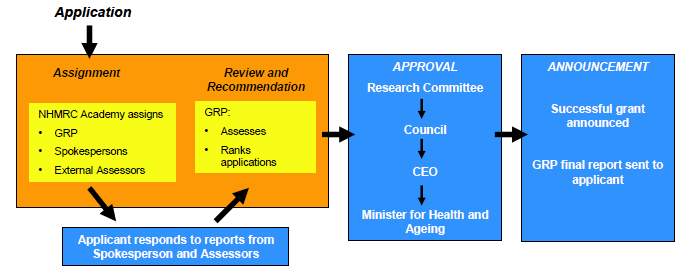|
|
|
|
|
|
|
News & Views item - February 2009 |
![]() Peer Review and the NHMRC. (February 26, 2009)
Peer Review and the NHMRC. (February 26, 2009)
Back in September 2007 the CEO of the National Health and Medical research Council, Professor Warwick Anderson, told The Australian's Bernard Lane: "There's never been a review of the NHMRC's procedures and the funding vehicles and how well they serve the aims and purposes of the NHMRC and the strategic plan."
He went on to say that the review would embrace everything from project and program grants through to training awards and fellowships to the peer review process, and any recommendations made will be considered for implementation from 2009.
Professor Anderson has now emailed TFW noting that the "NHMRC has recently provided a
detailed explanation of our
peer review processes on our website![]() ...
[and] in addition there is currently a large
independent study being undertaken of peer review in medical research, with
Australian participation".
...
[and] in addition there is currently a large
independent study being undertaken of peer review in medical research, with
Australian participation".
The nine page document, A description of the peer review process for project grant applications to NHMRC, provided goes into detail describing how the aim to ensure that NHMRC develop the best possible and fairest practices is being put into practice.
In summary the Council has put into operation a set of checks and balances to make peer review, not only objective, balanced and fair, but also informative to its applicants. Like all such evaluations it ultimately depends on the quality of those undertaking the evaluating, but from a logistics viewpoint the NHMRC's "Project Grant Category Descriptors" (page 9) militates against the younger researchers (short track record) and the more adventurous (daring) proposals.
That said, Professor Anderson, indicates that NHMRC's peer review system continues to be under development by concluding: "As ever, your thoughts and suggestions for improvements are always welcome. Comments should be forwarded to nhmrc@nhmrc.gov.au."

GRP = Grant Review Panel
The core of the system's strength and weakness is described in this paragraph which refers to external assessors:
A general principle of peer review is to strive to ensure that each application gets both the most expert and appropriate review possible and, as far as is feasible, all applications are subject to similar levels of expert review. In a country the size of Australia, there is a wide diversity in the size of the fields in health and medical research. As mentioned above, the consequence of this divergence in field sizes is that for larger fields, there can be many members of a GRP able to provide appropriate peer review for applications, but for small and emerging fields and disciplines, with many fewer applications, this is not the case. For these latter, applications face a more diverse panel consisting of several research fields and disciplines. That is, the numbers of discipline experts on a particular panel varies and therefore, to rebalance this, the fairest method is to try to bring at least two external reviews to every application.
For effective peer review Australia's research councils must have the resources to access overseas reviewers when it is advisable to do so. Senator Kim Carr as Minister for Science and Research would do far better service to the nation by developing the means and resources for that to become available rather than bulldozing through academe Excellence in Research for Australia.